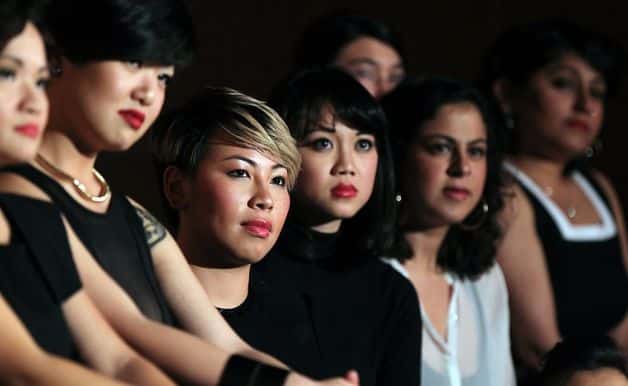Even though I attended an almost all Asian high school in San Francisco, I was still being taught that somehow, I did not fit into our (American) culture. I joined theater, but discovered that the teacher liked to stage plays “the way they were meant to look.” In other words, white students took the majority of the parts and almost every lead, leaving me and other Asians with a sense that we did not belong. Our white teacher couldn’t find a play that would have leads for ethnic characters? I remember being in Nicholas Nickleby, an adaptation of Charles Dickenson’s novel. Of course if we were to cast “the way things were meant to look” there would be no Asian leads. My point is that even in an Asian American dominated community somehow all the faces we see even in our local theater productions are somehow not Asian. One of my peers even started saying “it made sense” because the Asian face was “less expressive.” We have been brainwashed to placing the blame on ourselves for not fitting the American norm.
As Asian Americans, we all share in a kind of hybrid identity, stuck between two cultures. I immediately fell in love with reading as a little girl. I read all the time and everywhere, but it wasn’t until high school that I encountered Chinese-American literature that struck a chord within me. I couldn’t stop reading Maxine Hong Kingston and Amy Tan. Someone else feels the way I do! But, by tradition, I continued to read “American” classics in class, like The Great Gatsby and The Sound and the Fury. I forgot about ethnic literature. Only last year, Harvard hired its first Asian American English professor who focused on Asian American literature and theater, both of which resonated with me. For my thesis on Chinese-American literature, I have uprooted so many forgotten Chinese histories. In Kingston’s “Chinamen,” I relearned that pesky Chinese history about the first Chinese immigrants built the foremost railroads to connect our country under harsh and sometimes inhumane conditions. Asian workers were massacred by union workers, and these murders were disregarded by authorities. From China, only men were allowed to sojourn to the Beautiful Country, the Chinese name for America. Women were excluded so that no Asian families would take root on U.S. soil. Chinese enclaves called Chinatowns, better known for their tourism today, segregated the Chinamen from the more civilized Americans. In 1882, the United States Congress passed the Chinese Exclusion Act, which banned immigration of these undesirables, until it was finally lifted in 1943. Despite the contributions of Asian migrant workers, they were seen as foreign and exotic. All of these efforts in the past were to ensure that Asians did not join the civilized melting pot of America.
This past summer, the Pew Research Center’s report, “The Rise of Asian Americans,” stated, “Asian Americans are the highest-income, best-educated and fastest-growing racial group in the United States.” The report shows that the Asian American community is flourishing… So why is that, despite Asian American prosperity, they are so alienated?
Recently, group of four walks into a restaurant. “Three?” the waiter asks twice. I have no real idea what he thought, but it sure seemed like he couldn’t quite wrap his believe that a Chinese-American girl was at this restaurant with this white family (my boyfriend and his parents). We weren’t in some rural area of the United States where “it makes sense” that people are still a little bit racist, but in Boston. Either the waiter never realized what he implied with his statement or he chose to try to ignore his error, but either way he never apologized. The boyfriend’s family and I ended up laughing about the ridiculousness of his actions, because after all, what else were we going to do? Make a huge deal about his mistake? Everyone tries so hard to pretend we’re in some colorblind world, and if we even bring up race then we’re the “troublemakers” and we’re the ones who are “sensitive.” And maybe because my boyfriend is white, he gets uncomfortable when people sling around the word “racist” because sometimes it is an honest mistake. Maybe the waiter hadn’t seen me – or him, or his mother, or his father and truly only saw a group of three. But the fact we all were immediately drawn to the idea that the waiter was somehow treating me differently demonstrates that, regardless of whether the waiter was or wasn’t being racist, my race somehow still separates me from them. The truth is, it’s just easier to laugh it off instead of bringing up the possibility of dealing with someone racist. Should I have made a big deal about it? Should my boyfriend’s family? Would you have?
There’s still a long way to go until Asian Americans are no longer regarded perpetual foreigners, like the Chinese migrant workers who traveled overseas to strike gold before returning to their homeland, but rather that we are simple Americans just like everyone else.即使是在我就读过几乎所有旧金山的亚洲高中之后,
作为亚裔美国人,我们都共存在一种混合的文化中,
在刚刚过去的这个夏天,皮尤研究中心的名为《美籍亚裔的崛起》
最近我们一行四人走进了一个餐馆。“是三个人么?”
在达到让美籍亚裔人群不再被当做永远的外国人对待、


